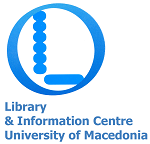Kostas Zontanos, Head of the Public Services Department of the Library & Information Centre of the University of Macedonia, shares in this post his view on the Library’s role in the research conducted by the faculty members of the University of Macedonia, talks about the Library’s role in supporting the principles of open access and outlines the benefits of open access journals for the academic community.
Q: What is the Library’s role in the research conducted by the faculty members of the University of Macedonia?
KZ: The Library and Information Center as a member of the Greek Academic Libraries Consortium HEAL-Link provides access to a large number of journals published by the most known publishers (Cambridge University Press, Elsevier, Emerald, Oxford University Press, Sage, Springer, Taylor & Francis, Wiley InterScience and more). Furthermore, it provides federated search platforms (EBSCO Discovery System and VUFind) in order for the users to gain access to the library’s entire collection through a single access-point. Additionally the Library has organized academic literacy workshops, which focused on teaching scholar writing and publishing skills to young researchers (master and php students).
The Library’s website provides all the necessary information and guidelines to the faculty researchers referring to tools and information resources with which one can find the research impact of his own work, as well as information on some basic bibliometric indices, e.g. h-index, g-index, etc.
Library’s personnel specialized in citation analysis and bibliometric surveys support all the University’s initiatives for research assessment and development.
Q: Does the Library & Information Centre of the University of Macedonia support the principles of open access? If so, in what way?
KZ: The Library of the University of Macedonia is among the first Greek libraries established and registered in the relevant international register, the institutional repository “Psepheda”. In the framework of the project “Open Access Scholarly e-Content at UOM: supporting library services for its organization, promotion, publication & interconnection” (NSRF 2007-2013, OP Digital Convergence, B2, MIS 304170), the Library provides the following specialized open access platforms and services, since October 2015:
- A specialized “Institutional Repository of Academic Research” for the archiving of the research output of the University (faculty publications)
- The new “DSpace: Digital Library and Institutional Repository” (which among others includes the Greek Historical Library of Economic and Social Sciences as well as University of Macedonia theses, master and phd dissertations)
- The digital library service Open Journals System to manage journals that the library has digitized (eg Balkan Studies, New Economy, Educational Inspection, Place) and to enable the academic community to create and maintain new electronic open access journals
• The digital library service Open Conference System to enable management, publishing and archiving of scholarly conferences - An online “University of Macedonia Open Access Guide”.
Q: Are there benefits if the academic community publishes in open access journals?
KZ: Open Access can refer to publishing initiatives where journals make their articles freely accessible immediately on publication (golden road to open access), or to self-archiving initiatives where authors make copies of their own published articles freely accessible via a subject-based or institutional repository (green road to open access).
Open Access provide free webwide access to research journal articles immediately and permanently. Research that is freely accessible on the web has 25%-250% greater research impact. If 100% of research articles were freely accessible (open access), then the usage, productivity and progress of research would be maximized.
About Kostas Zontanos
Kostas Zontanos is Responsible for the Public Services Department of the Library & Information Centre of the University of Macedonia since 1994 with active participation in most of the Library’s projects. He was also an active member of the Steering Committee for setting up of the Greek Academic Libraries Union Catalogue for four years (1997 – 2001) and from 2000-2009 was an Applied Courses Professor in the Department of Librarianship of the Technological Educational Institute of Thessaloniki. (Taught module: “Cataloguing III: MARC & other metadata standards”). He holds a B.A. degree in Librarianship from the Educational Institute of Thessaloniki, a second B.A.degree in Italian Language and Literature from Aristotle University of Thessaloniki, Greece and a Master’s Degree in Education from Hellenic Open University.
You can further connect with Kostas on LinkedIn or reach him via e-mail.
The Library & Information Centre of the University of Macedonia was founded in 1962. The mission of the Library & Information Center is to support the educational and research programs of the University, the teaching needs of the academic staff of the University and the research needs of members of the university community.
Connect with the Library & Information Centre of the University of Macedonia on LinkedIn, become a Friend on Facebook, Pin on Pinterest or watch on YouTube.









